

Snack food could soon start spying on you. Plant-Based Beyond Eggs Taste Like the Real Thing Without Environmental or Ethical Impact. Photo via Shutterstock.
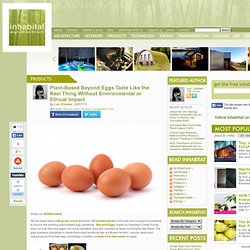
Plant-Based Egg Substitute Backed by Bill Gates Goes on Sale at Whole Foods. Tech giants Peter Thiel and Bill Gates introduced a revolutionary new product to the public this week, and it had nothing to do with computers or software.
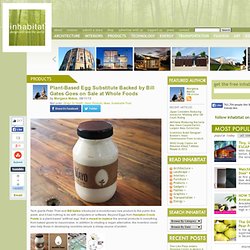
Beyond Eggs from Hampton Creek Foods is a plant-based “artificial egg” that is meant to replace the animal products in everything from baked goods to mayonnaise. In addition to creating a vegan alternative, the invention could also help those in developing countries secure a cheap source of protein. Lely Astronaut A4 milking robot lets cows milk themselves. If cow milking recalls a bucolic image of a farmer strolling out to the barn with a bucket and stool, then the 21st century will be a disappointment to those raised on James Herriot stories.
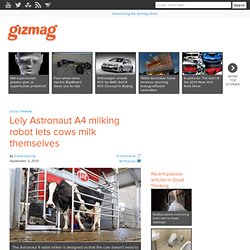
A case in point is the Astronaut 4 from Dutch agricultural firm Lely. With this robotic milker, the farmer needn't come any closer to the action than a readout on a smartphone, leaving the cows to get on with the milking themselves. View all Milk is big business with over 20 billion gallons (76 billion l) produced in the US alone. Modern milk cows produce an average of 6.5 gallons (24.6 l) of milk per day. New York City Turns to Composting. In 2011, the United States produced 250 million tons of municipal solid waste, 56% of which was compostable materials.
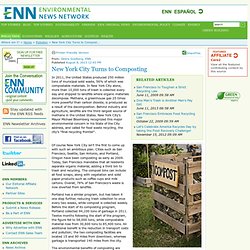
In New York City alone, more than 10,000 tons of trash is collected every day and shipped to landfills where organic materials decompose. Methane, a greenhouse gas 25 times more powerful than carbon dioxide, is produced as a result of the decomposition. Behind industry and agriculture, landfills are the third-largest source of methane in the United States. New York City’s Mayor Michael Bloomberg recognized this major environmental concern in his State of the City address, and called for food waste recycling, the city’s "final recycling frontier".
Of course New York City isn’t the first to come up with such an ambitious plan. Portland has a similar program, but has taken it one step further, reducing trash collection to once every two weeks, while compost is collected weekly. We are way off target if we hope to feed everyone by 2050. Norman Borlaug, a hero of feeding the less fortunate, estimated that if all the world's available farm-space was converted to organic crops, there'd only be enough food to feed four billion people.
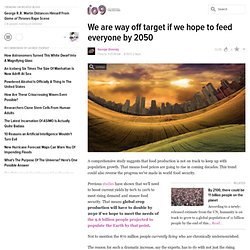
Chia seeds as a bread ingredient. Adding chia seeds to bread recipes significantly increases final product levels of proteins, lipids, ash and dietary fiber, and consumers like it too, according to research.
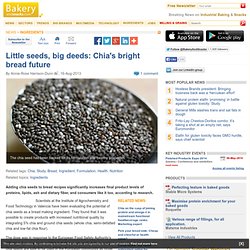
Scientists at the Institute of Agrochemistry and Food Technology in Valencia have been evaluating the potential of chia seeds as a bread making ingredient. They found that it was possible to create products with increased nutritional quality by integrating 5% chia and ground chia seeds (whole chia, semi-defatted chia and low-fat chia flour). The dose was in response to the European Food Safety Authority’s (EFSA) judgement back in 2009 that chia seeds and whole ground chia seeds are safe to be used in the European community as novel food ingredients at this level within bread products. What’s the difference? Sensory analysis in the study showed that the inclusion of chia, “increased overall acceptability by consumers.” Omega-3 rich infant formula may boost later intelligence: Study. Consumption of a DHA-enriched formula in infancy may be linked to positive cognitive outcomes in childhood, according to new research data.
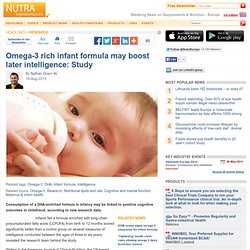
Infants fed a formula enriched with long-chain polyunsaturated fatty acids (LCPUFA) from birth to 12 months scored significantly better than a control group on several measures of intelligence conducted between the ages of three to six years, revealed the research team behind the study. Writing in the American Journal of Clinical Nutrition, the US-based researchers said that children who had consumed the docosahexaenoic acid (DHA)-rich formula showed increased development in detailed tasks involving pattern discrimination, rule-learning and inhibition as well as better performance on two widely-used standardised tests of intelligence. "The results imply that studies of nutrition and cognitive development should be powered to continuethrough early childhood," added the researchers. Study details. Foundations for next food scandal being laid as retailers move away from shorter supply chains. The foundations for the next food scandal are already being laid by some retailers as they edge away from shorter supply chains that were promised following the horse meat scandal, according to the National Pig Association.
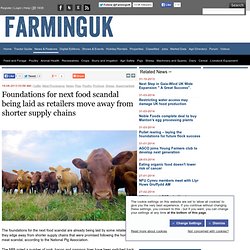
The NPA noted a number of pork, bacon and gammon lines have been switched back to imported product, because it is marginally cheaper. "Since the heat has come off the horsemeat scandal we've started to see retailers sliding back from the strong British position they publicly adopted, and import more European product," said NPA general manager Dr Zoe Davies. Shell shocker: French oysters hit as mystery killer spreads - Nature - Environment.
The bizarre weather – weeks of rain and cold followed by tropical temperatures – is officially blamed for the sudden death of scores of thousands of oysters in south-western France, Brittany and Normandy.

But producers fear that an unknown disease may be devastating oyster beds, stricken since 2008 by a virus which massacres baby oysters. Surface-scanning coil detector for detection of bacteria on fresh food. Pathogens can be detected on fresh food surfaces in real-time and in-situ thanks to a coil measurement technique demonstrated by researchers.
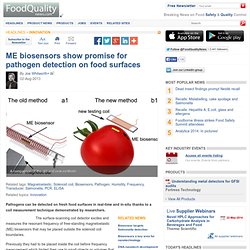
The surface-scanning coil detector excites and measures the resonant frequency of free-standing magnetoelastic (ME) biosensors that may be placed outside the solenoid coil boundaries. Previously they had to be placed inside the coil before frequency measurement which limited their use to small objects or volumes that will fit within the coil, said Chai et al. Would You Eat These Plates Of Living, Breathing Food? We’ll probably eat lab-grown meat one day. 'Perfect' food for 'perfect' prawns. Public release date: 1-Aug-2013 [ Print | E-mail Share ] [ Close Window ] Cradle turns smartphone into handheld biosensor. CHAMPAIGN, Ill. - Researchers and physicians in the field could soon run on-the-spot tests for environmental toxins, medical diagnostics, food safety and more with their smartphones. University of Illinois at Urbana-Champaign researchers have developed a cradle and app for the iPhone that uses the phone's built-in camera and processing power as a biosensor to detect toxins, proteins, bacteria, viruses and other molecules.
New active package for keeping vegetables a...